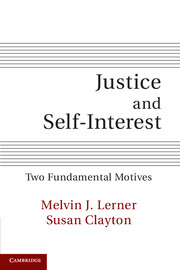Book contents
- Frontmatter
- Contents
- List of Figures and Tables
- Preface
- 1 Contesting the Primacy of Self-Interest
- 2 Why Does Justice Matter? The Development of a Personal Contract
- 3 Commitment to Justice: The Initial Primary Automatic Reaction
- 4 Explaining the Myth of Self-Interest
- 5 Defining the Justice Motive: Reintegrating Procedural and Distributive Justice
- 6 How People Assess Deservingness and Justice: The Role of Social Norms
- 7 Integrating Justice and Self-Interest: A Tentative Model
- 8 Maintaining the Commitment to Justice in a Complex World
- 9 Bringing It Closer to Home: Justice in Another “American Tragedy”
- 10 Emotional Aftereffects: Some Negative Consequences and Thoughts on How to Avoid Them
- References
- Author Index
- Subject Index
3 - Commitment to Justice: The Initial Primary Automatic Reaction
Published online by Cambridge University Press: 03 May 2011
- Frontmatter
- Contents
- List of Figures and Tables
- Preface
- 1 Contesting the Primacy of Self-Interest
- 2 Why Does Justice Matter? The Development of a Personal Contract
- 3 Commitment to Justice: The Initial Primary Automatic Reaction
- 4 Explaining the Myth of Self-Interest
- 5 Defining the Justice Motive: Reintegrating Procedural and Distributive Justice
- 6 How People Assess Deservingness and Justice: The Role of Social Norms
- 7 Integrating Justice and Self-Interest: A Tentative Model
- 8 Maintaining the Commitment to Justice in a Complex World
- 9 Bringing It Closer to Home: Justice in Another “American Tragedy”
- 10 Emotional Aftereffects: Some Negative Consequences and Thoughts on How to Avoid Them
- References
- Author Index
- Subject Index
Summary
The personal contract–based theory of the commitment to deservingness and justice stands in stark contrast to contemporary self-interest theories on at least two key issues. One of these, the most obvious, concerns what people care about, or what motivates their decisions and actions: do people invariably and primarily attempt to promote their own welfare and gratify their desires, or are their initial reactions guided by their commitments to deservingness and justice? The related second issue involves the underlying psychological processes in people's reactions to an occurrence of consequence: does their initial, automatic, and often unconscious egocentric and egoistic reaction give self-interest “primal power” to influence their judgments (Epley and Caruso, 2004; Moore and Loewenstein, 2004)? Or, because of their commitment to justice, do people initially focus their attention on the question of who deserves what? According to the personal contract theory, peoples' central commitments to deservingness and justice would naturally lead them to automatically attend and respond to cues of what has happened to whom. Their initial automatic reactions would include preconscious evaluations of someone's outcomes together with evaluations of the person's entitlements as a function of who they are and what they have done. Discrepancies between those two evaluations – outcome and entitlements – elicit justice imperatives composed of affective responses and efforts to eliminate the discrepancy. Although this occurs automatically as the initial preconscious reaction in response to the salient cues in an encounter, subsequent and more thoughtful controlled processing often modifies and alters these reactions in specifiable ways.
- Type
- Chapter
- Information
- Justice and Self-InterestTwo Fundamental Motives, pp. 40 - 58Publisher: Cambridge University PressPrint publication year: 2011



